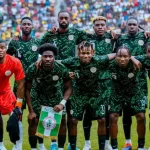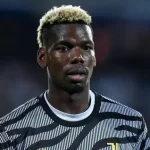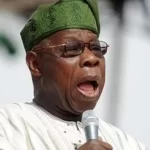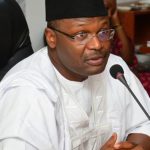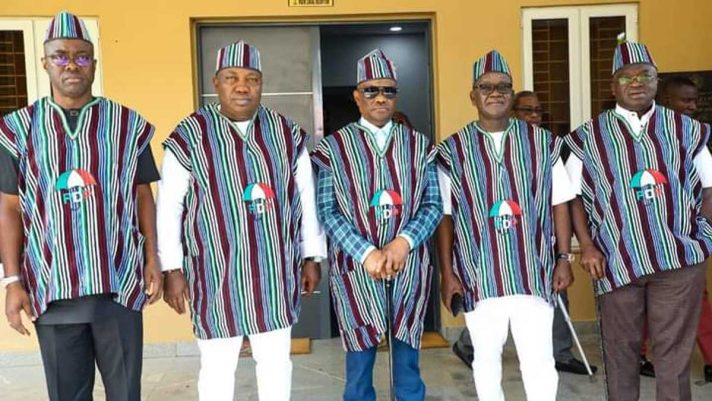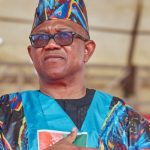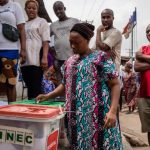By Adamu Abuh, Abuja

Governors Seyi Makinde of Oyo State (left); Ifeanyi Ugwuanyi of Enugu State; Nyesom Wike of Rivers State; Samuel Ortom of Benue State and Okezie Ikpeazu of Abia State at Benue State Government House in Makurdi.
Tinubu emerged victorious in the keenly contested poll with a total vote of 8,794,726 as against 6,984,520 and 6,101,533 garnered by Atiku Abubakar of the Peoples Democratic Party (PDP) and Peter Obi of the Labour Party (LP), while Rabiu Kwankwaso of the NNPP came fourth with 1,496,687 votes.
Notwithstanding the votes garnered by Tinubu in the South West, North West and the North East geopolitical zones, the role played by the G5 governors comprising Nyesom Wike (Rivers), Samuel Ortom (Benue), Seyi Makinde (Oyo), Okezie Ikpeazu (Abia) and Ifeanyi Ugwuanyi of Enugu States dealt a fatal blow to his challenger, Atiku Abubakar, preventing him from actualising his presidential aspiration.
The G5 governors, aside rooting for the return of power to the Southern part of the country in line with the principle of rotational presidency, made a futile bid to get the PDP National Chairman, Dr Iyorchia Ayu to step down because he is from the same northern region as Atiku.
Although the G5 governors actually met with Tinubu in London on December 27, 2022, none of them officially endorsed his candidacy in the build up to the presidential poll.
Wike, who was one of the 12 contenders that lost to Atiku Abubakar during the PDP primary last year, advertently took sides with Tinubu as he did not only boycott the PDP nationwide campaign trail, but tacitly denied Atiku Abubakar and his key allies in Rivers State the opportunity to canvass for votes in the state.
Wike not only permitted the Tinubu campaign trail to use the Yakubu Gowon Stadium in Elekahia, Port Harcourt, he was said to have facilitated the mobilisation of the mammoth crowd that attended the rally.
Widely believed to have directed all his cabinet members, aides and local council chairmen in the state to support Tinubu, Wike met with him at the Government House in Port Harcourt where he pooh-poohed the naira redesign policy that had been endorsed by Atiku.
APC chieftains including Governors Atiku Bagudu (Kebbi), Babajide Sanwo-Olu (Lagos), David Umahi (Ebonyi), the National Chairman of APC, Adamu Abdullahi, former Ekiti State Governor, Kayode Fayemi, and the Minister of State for Petroleum Resources, Timipre Sylva, were also at the meeting.
As such, Tinubu’s victory in the Rivers State presidential poll did not come as a surprise as Wike and his surrogates not only de-campaigned Atiku Abubakar, they were accused of suppressing votes meant for the Labour Party (LP) presidential candidate, Mr Peter Obi to achieve the goal.
Peter Obi was reported to have been in an early lead with over 169,414 votes as against Tinubu’s 148,979, with the results from 21 out of 23 local council areas released by the Independent National Electoral Commission (INEC). But Tinubu, in controversial circumstances, later overtook Obi when the results from the two remaining local councils – Obio-Akpor and Degema came in, scoring additional 80,239 as against Peter Obi’s 3,829, followed by Atiku Abubakar’s mere 368 votes.
In the final collated results, Tinubu polled 231,591, Peter Obi scored 175,071 and Atiku Abubakar scored 88,468 to come second and third respectively.
In the 2019 presidential poll when all was well between Atiku Abubakar and Wike, he scored 473,971 to defeat outgoing President Muhammadu Buhari of the APC who had 150,710 votes.
The claim by the Rivers State Collation Officer, Prof Charles Teddy Addias of series of threat from some political party faithful and unconfirmed members of the public after he was forced to suspend the exercise, spoke volume of underhand dealings in the state.
Yiaga Africa, a non-governmental organisation acknowledged that the results from Imo and Rivers states were inconsistent with its projections for the states. In it’s post-election report titled, ‘The 2023 presidential elections are once again a missed opportunity: INEC must be fundamentally reformed,’ the group, led by Samson Itodo, alleged that the results announced by INEC in both Rivers and Imo states were manipulated.
It noted in part: “The state-level presidential results for Imo and Rivers are inconsistent with the Yiaga Africa WTV projections for both states. For Rivers, INEC announced 231,591 votes for APC or 44.2 percent; 175,071 for LP or 33.4 percent; and 88,468 for PDP or 16.9 percent. This is in sharp contrast to the Yiaga Africa WTV estimates for Rivers which are: APC 21.7 percent ±5.0 percent; for LP 50.8 percent ±10.6 percent; and PDP 22.2 percent ±6.5 percent.”
LP’s National Chairman, Julius Abure, who was livid over the development, alleged that elections were manipulated in places like Obio/Akpor, Khana, Eleme, Obigbo and Rumukoro, amongst others, in Rivers.
He alleged that political thugs invaded various polling units and collation centres, took away election materials including the results sheets and manipulated the BVAS machines and uploaded fake results into the central portal.
“We took particular note of incidences in places like Obio/Akpor, Khana, Eleme, Obigbo, Rumukoro and several other areas where Labour Party was clearly leading in virtually all the polling units with very wide margins,” he stated.
Abure alleged that at the polling units in Governor Wike’s compound in Worji, Obi actually scored 323 votes as against Tinubu and Atiku Abubakar who polled 5 and 2 votes respectively.
Claiming that security agents were used to snatch ballot papers, he noted: “Nigerians went into this election based on the assurances by INEC that the deployment of BVAS was a perfect antidote to electoral malpractices in Nigeria, but what transpired across Nigeria, if allowed to stand, is purely a betrayal of trust.”
“Some of these manipulations happened late in the night. We demand that INEC investigate these atrocities against Nigerian voters by the political class. We are therefore asking that INEC should rise to the occasion and cancel all the unverified and manipulated results arising from the presidential and national assembly elections in parts of Rivers state particularly in places like Obio/Akpor, Khana, Eleme, Obigbo and Rumukoro, amongst others.”
In Benue State where Governor Ortom holds sway, the inability by Atiku Abubakar to sweep the state may not be unconnected with the open declaration of support by Governor Ortom for Peter Obi. The development turned out to be a major boost for Tinubu as the APC governorship candidate, Rev Fr Hyacinth Alia is loved by the electorate in the state.
Tinubu polled a total of 310,468 votes, ahead of Peter Obi who polled 308,372 as he emerged second in the state, leaving Atiku Abubakar in the third position with 130,081 votes while the New Nigeria Peoples Party (NNPP) presidential candidate, Rabiu Kwankwaso, received 4,740 votes.
This is in contrast to the 355,355 votes polled by Atiku as against the 347,668 received by President Buhari in the 2019 presidential poll.
Governor Ortom, his deputy, Benson Abounu, commissioners, aides and the 22 local council chairmen in the state were absent at the campaign rally of Atiku earlier in the year.
Ortom, who had an altercation with Atiku over the incessant attacks unleashed by herders on the people of Benue State, was quoted as saying: “To hell with Atiku and any other Fulani man. And any man supporting Atiku and all that is an enemy. I want this to be known as long as I am governor. They should go and tell him. You want me to be a slave for a Fulani. Anybody supporting Atiku is an enemy of Benue. My people are being killed and you want me to be quiet. My tenure ends in May and you can do whatever you want if you think you have the powers.
“I have written my will. When I gave it to my wife, she cried all night. If I die at 62, many of my mates have gone a long time ago and if I die today, I’m a fulfilled person. But let it be recorded that I died resisting the invasion and killing of my people.”
Though Governor Seyi Makinde of Oyo State stayed away from Atiku’s rally held in Ibadan in solidarity with members of the group earlier in the year, his last minute show of support for Atiku Abubakar came handy after he came under heavy pressure by National Assembly candidates who feared his open support for Tinubu might likely affect their fortunes negatively.
Makinde, who remained adamant on the need for power shift to the south, was quoted while hosting Tinubu at the Government House in Ibadan thus: “Players will come and go, but our country will remain. So, we, the G5 and Integrity Group, are saying that if we have to choose between the unity of this country and our political aspirations, we will choose the unity of this country.
“So, I alluded to the sacrifices made by our colleagues, the governors of the APC from the Northern part of the country, because we also monitored your emergence and they sacrificed some certain things for the unity of the country. We have to move on as a people.”
Tinubu polled 449,884 to defeat Atiku Abubakar, who garnered 182,977, Peter Obi who had 99,110 votes and Rabiu Kwankwaso of the NNPP, who polled 4,095 votes to come fourth.
Governor Makinde’s indecision took a heavy toll on the fortunes of the PDP in Oyo state as it lost the three senatorial districts, and eight House of Representatives seats to the APC, leaving the remaining four House of Representatives seats to his party, with two others up for grabs by both the APC and PDP.
The antagonistic stance of Governors Okezie Ikpeazu (Abia) and Ifeanyi Ugwuanyi (Enugu) to the Atiku presidential ambition turned out to be disastrous as they failed to withstand the onslaught of Obi’s Labour Party during the presidential poll in the entire South East geopolitical zone of the country.
Ugwuanyi, who stayed away from Atiku’s campaign in Enugu, lost his senatorial bid to a relatively obscure Okechukwu Ezea of the Labour Party in spite of his open opposition to both the PDP and APC in the state.
Source: The Guardian

